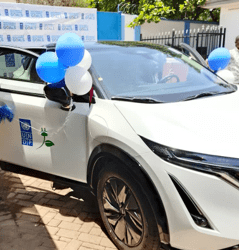By Konrad Kodjo DJAISI
The United Nations Development Programme (UNDP) Ghana has taken a significant step toward reducing carbon emissions and transitioning to cleaner energy by unveiling its first e-mobility solution, a US$64,617 investment in both an electric vehicle and an on-site charging station.
The initiative, complemented by a comprehensive Market Opportunity Study on Electric Vehicle (EV) Charging Stations, jointly produced with the Energy Commission and the Ministry of Environment, Science and Technology, was launched at the UNDP office in Accra last week Thursday.
The Market Opportunity Study Report on EV Charging Stations, funded by Germany through the Climate Promise, offers valuable insights into Ghana’s rapidly evolving electric mobility landscape, highlighting key challenges, emerging opportunities and strategic recommendations for establishing a robust EV charging infrastructure.
By addressing critical gaps, the report aims to accelerate Ghana’s green transition and support the country’s shift toward sustainable transport solutions.
Speaking at the launch, UNDP Ghana’s Resident Representative, Niloy Banerjee, highlighted the theme ‘Sustainable Mobility: Powering Ghana’s Green Future’, underscoring the organisation’s commitment to climate action and sustainable energy solutions in Ghana.
“There is an urgent need to accelerate and scale up Ghana’s transition to greener pathways, including green mobility solutions that target several segments of the population.
Sustainable and green mobility will support efforts toward greenhouse gas emission reductions, improve urban air quality, and promote energy security.”
Abdul-razak Saeed, Lead for Environment and Climate at UNDP Ghana, also emphasised the importance of the Market Opportunity Study Report on EV Charging Stations. “As Ghana embraces the shift toward sustainable mobility, building a strong EV charging infrastructure is key.
This report provides a roadmap for unlocking the full potential of EV adoption, outlining clear opportunities for investment, policy action and private sector engagement to accelerate Ghana’s green transition.”
Launching the report, Mrs. Eunice Biritwum, Executive Secretary of the Energy Commission, also shared valuable insights regarding the role of policy and regulatory frameworks in advancing Ghana’s transition to electric mobility.
“This joint launch underscores the commitment of the commission and UNDP to driving climate action and sustainable energy solutions, as well as fostering partnerships to support Ghana’s low-carbon development agenda.”
The transition to electric vehicles aligns with UNDP’s global Moonshot Target to reduce vehicle-related greenhouse gas emissions by 50 percent by 2030. Through this project, UNDP Ghana anticipates an annual reduction of 5.23 tonnes of CO₂ emissions, along with projected cost savings exceeding US$2,138 per year.
By embracing electric mobility, UNDP Ghana aims not only to reduce its own carbon footprint but also to inspire other organisations to adopt cleaner and more sustainable transport solutions.

As Ghana advances in its adoption of electric vehicles, this initiative by UNDP serves as a model for sustainable transport in the country and the growing feasibility of clean transportation and its critical role in achieving a more sustainable future for all Ghanaians.










